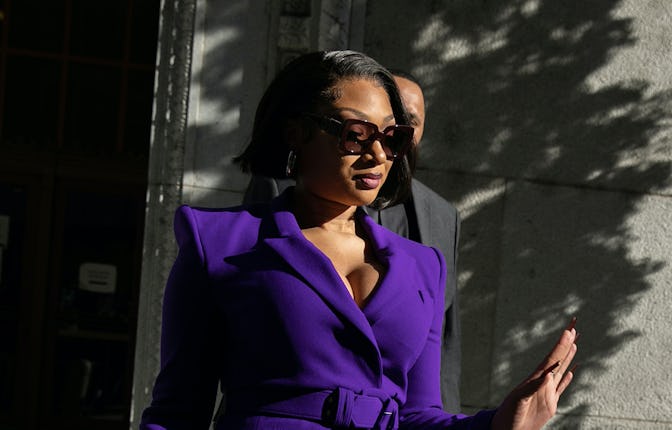"Megan does matter": The powerful closing argument in Tory Lanez's trial
Since speaking out about her trauma, Megan Thee Stallion has faced a barrage of backlash — something Black women are far too familiar with.

Trigger Warning: This piece contains mentions of domestic violence and suicidal thoughts.
After weeks of highly visible courtroom proceedings, rapper Tory Lanez’s trial for allegedly shooting Megan Thee Stallion, aka Megan Pete, is finally coming to a close. The case has amounted to a years-long struggle for Meg, as she’s grappled with a torrent of online abuse for speaking out about her harrowing experiences with the shooting incident involving Lanez – and the closing arguments from the trial make a powerful statement about how the voices of Black women should be valued.
“Megan does matter,” Deputy District Attorney Alexander Bott told the jurors in his Dec. 21 closing argument, AP News reported. “This case matters. Hold [Lanez] accountable for shooting Megan over nothing more than a bruised ego.” The legal battle began in October 2020, when Los Angeles County prosecutors charged Lanez with shooting Meg in a July 2020 incident.
Since speaking out about her experiences online, Meg has faced a barrage of backlash from both the public and the hip hop community, which Bott also referenced in the closing argument. “Why would she lie?” he said. “She’s been subjected to a stream of hate. For what? For coming forward as a victim of domestic violence?”
Several prominent critics and artists within the hip hop community, such as 50 Cent, DJ Akademiks, and Cam’ron, have expressed doubt, joked about, or even spewed outright disdain for the 25-year-old Grammy-award winning artist. On Dec. 21, former rapper and current podcast host Joe Budden issued an apology to Meg for the vitriol he directed at her and for joking about her mental health. “I’m apologizing to Meg,” the retired rapper said. “Meg, the people that love her, her handlers, her team, the people that have to support her through what has to be an exhausting trial. I listened back. I got a few phone calls from women that I love and appreciate and admire.”
For Meg, the years-long saga has resulted in severe mental health struggles. When she took the stand on Dec. 13 to recount her harrowing experiences since the shooting, the rapper revealed her battle with suicidal thoughts. “I can't even be happy,” she said, her voice audibly breaking as she spoke, per NBC News. “I can't hold conversations with people for a long time. I don't feel like I want to be on this earth. I wish he would have just shot and killed me, if I knew I would have to go through this torture."
Unfortunately, Meg is far from alone in her experiences; the abuse Black women face when speaking out about their trauma is part of a larger pattern of misogynoir, and it’s often a key factor in keeping Black women silent. Meg herself addressed this pattern in an October 2020 essay for The New York Times. “Black women are still constantly disrespected and disregarded in so many areas of life,” she wrote. “We deserve to be protected as human beings. And we are entitled to our anger about a laundry list of mistreatment and neglect that we suffer.”
If you or someone you know is experiencing domestic abuse, call 911 or the National Domestic Violence Hotline at 1-800-799-SAFE (7233) or visit thehotline.org
If you or someone you know is experiencing suicidal thoughts, call or text 988 to contact the 988 Suicide & Crisis Lifeline, which provides free 24/7 support. You can also reach out to the Trans Lifeline at 1-877-565-8860, the Trevor Lifeline at 1-866-488-7386, or to your local suicide crisis center.